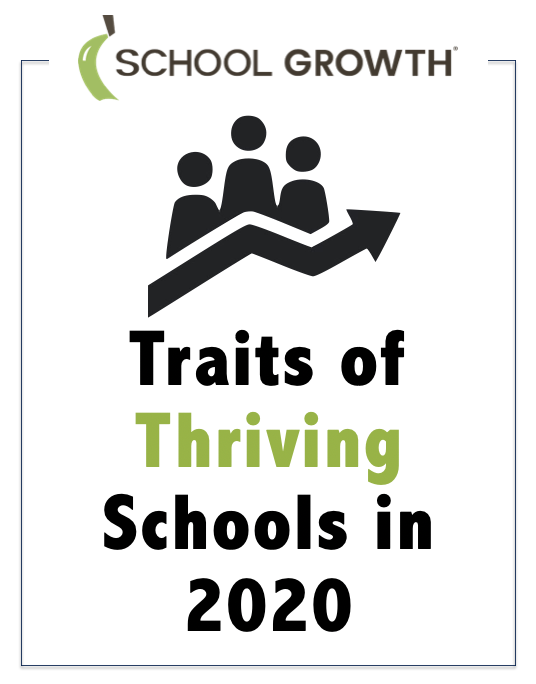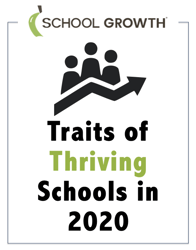
SIX Traits Thriving Schools Have in Common
 From their research of school growth and performance over the first half of 2020, The Fordham Institute shared, "Five things schools thriving during Covid-19 have in common."
From their research of school growth and performance over the first half of 2020, The Fordham Institute shared, "Five things schools thriving during Covid-19 have in common."
These traits offer valuable insight, and we added one more that is critically important for those administrators who want to sustainably thrive.
The Fordham report identified these 5 traits of thriving schools in 2020:
- A deep understanding of the student body and their needs
Strong relationships are critical for ensuring engagement in learning and ensuring that parents and students remain connected to the school community. - A pre-existing and continued commitment to high-quality teaching
Talented, energized, engaged educators adapted their craft to the benefits and constraints of online learning, and wise administrators likewise found ways to sustain culture even though the team is dispersed. - A focus on student-centered learning
The faculty and pedagogy is committed and designed to grant autonomy to students to set their learning goals, to access the curriculum through a learning management platform, and to establish evidence of meeting their learning objectives. - Pre-existing use of technology for learning
As you would expect, schools that already were significantly using technology-based learning had an advantage and were able to shift more easily to distance learning. - An ability to innovate quickly
Finding new ways to solve the challenges of a decentralized culture, online teaching, communication management, etc., is always beneficial and especially today. It’s not just innovating that’s critical here, but also the ability to quickly and collaboratively reprioritize as a team and effectively implement new directions.
Our data reflects similar characteristics, but we must add to that list one critical factor:
Sustainably growing schools prioritize a healthy faculty culture that enables them to thrive.
Much has been written about the stresses experienced by teachers and staff in managing changes in lesson planning, instructional practices, disease management, feedback and coaching, etc. Sustaining faculty culture in this environment requires even greater focus by administrators on relationship building habits that foster trust.
These habits include:
- Smile, as a reflection of your joy in leading and learning
- Express genuine interest in them as a whole person
- Say Thank You--Frequently!
- Ask them what they need and then deliver on your promises
- Engage in conversation, without distractions (e.g., phone, watch, etc.)
- Affirm their strengths, contributions, and growth
- Reveal your own goals, plans, and progress
Your people and relationships are the organization's most valuable asset. If you really believe that to be true, then investing in them must remain your top priority in order to thrive.
That includes creating a strategic plan, supported by disciplined short-term execution, where people, culture, and curriculum progressively and purposefully grow.

.png?width=1000&height=199&name=SG-Logo3-Transparent-1000x199px%20(1).png)


.jpg?width=100&height=100&name=elementary%20student%20squeezing%20a%20stuffed%20animal%20while%20holding%20their%20breath%20(1).jpg)

